Reviews
Larry Cohen
USA, 1976
Credits
Review by Budd Wilkins
Posted on 16 October 2013
Source Blue Underground DVD
Categories 31 Days of Horror X
Larry Cohen is a past master at smuggling acerbic social and political satire into low-budget B pictures saddled with ostensibly outrageous premises: the monstrous baby in It’s Alive plays on widespread fears generated by the collusion of Big Pharma in, among other cases, the infamous thalidomide epidemic of the early 1960s. The Stuff tackles rampant ’80s consumerism by introducing a sentient alien foodstuff that in turn consumes its consumers. But none of Cohen’s other films can touch God Told Me To for sheer audacity, combining the handheld verisimilitude of gritty police procedurals like The French Connection with a loopy premise straight out of Erich Von Däniken’s Chariots of the Gods? In other words, God Told Me To puts the high back into high concept.
Devout Catholic NYPD Detective Peter Nicholas investigates a series of seemingly random mass murders: a sniper takes out pedestrians from a rooftop water tower, a father shoots his entire family, and a uniformed officer opens fire during the St. Patrick’s Day parade. When apprehended, the perpetrators can supply no other justification for their rampages than the decidedly unhelpful title phrase. What slowly becomes evident is that someone is exerting a baleful influence over them that borders on absolute mind control. One subtly terrifying scene has Nicholas interrogating the family annihilator, shown sitting calmly amidst the carnage, all tousled hair and tattered bathrobe. He good-naturedly recounts preceding events. After witnessing the deaths of her mother and brother, his young daughter sought refuge by locking herself in the bathroom, but he managed to convince her that it was all just a harmless game. He concludes: “She was laughing when she came out. And I was laughing when I shot her.” Later in the film, Cohen cannily shows how the panic resulting from these killing sprees can be used as a smokescreen for settling petty grievances — even here there’s a tellingly political edge — when a low-level hood shanks a corrupt cop and then proceeds to smear the word GOD in his blood near the crime scene.
Nicholas’ investigation leads to a cadre of bankers and business executives who have become the de facto disciples of the “new god,” a furtive figure who exudes an unearthly incandescence and whose archetypal element (infernally enough) appears to be fire. In a brief but key scene, Cohen clues us in to the philosophical rationale of this new Messiah. Gathered around a boardroom table that’s cheekily reminiscent of Leonardo’s The Last Supper, one of the disciples betrays some scruples: “Why all the bloodshed? Can’t he communicate by any other media than violence?” To which another replies: “The only way the Lord has ever successfully disciplined us is through fear. Cure a man and you impress a few people who already believe anyway. Kill a multitude and you can convince a nation.” Feel free to insert whatever shadowy cabal you prefer; I like to think of these guys as the executive board of the Parallax Corporation. At any rate, Cohen caustically taps into the vein of mistrust in the powers that be following hard on the heels of the Watergate scandal.
When it comes to depicting the miraculous origins of this divine being, who’s tagged with the utterly mundane moniker Bernard Phillips, Cohen resorts to sepia-tinted footage meant to represent eyewitness testimony; thus, what we see is only one possible version of events. Later, when Peter Nicholas seeks out his own birth mother, Cohen’s recreation of her alien abduction incorporates stock footage he lifted from the cult TV series Space: 1999, so that the film’s associative skein expands to include even inadvertent intertextuality. (It also highlights a formal and thematic debt a series like The X Files owes to Cohen’s film.) In the final moments, we witness the apparent death of the new god, but the editing in this sequence is so haphazard and disjointed that it’s impossible to be sure he’s actually destroyed. Throughout the film, then, Cohen cultivates Heisenberg levels of uncertainty.
The film’s third-act twist reveals Peter Nicholas as the product of an earlier failed attempt at alien/human interbreeding. His religious mania is thus a projection of his own feelings of otherness onto an elevated spiritual plane, an effort to deny his “divine” essence through an identification with socially acceptable religious phenomena. Cohen positions Peter as Bernard’s opposite in every way. The resolutely religious Peter refuses to procreate despite having both wife and lover. In fact, he has brought about several miscarriages by unconsciously invoking his preternatural powers. For his part, Bernard can and will procreate. During their final confrontation, Bernard informs Peter, “In me, everything human is recessive.” And with one bravura gesture, he displays the ultimate incoherent text: his own hermaphroditic flesh. He even offers to sire Peter’s offspring, ensuring him that they will be fully “divine” like him.
I use the term “incoherent text” advisedly. Critic Robin Wood writes about God Told Me To at some length in his book Hollywood from Vietnam to Reagan, repeatedly linking this film’s incoherence to Cohen’s political radicalism. This prompts the inevitable question: Is there a way to read the film’s incoherence in a way that jibes with what Wood calls “progressive”? It would seem not, if by that word we identify an accommodation of (and allowance for) the the polymorphous perversities of the monstrous. Peter Nicholas can only destroy that which he can never accept. Ultimately, that has nothing to do with a troubled conscience over Bernard’s reign of violence, but everything to do with the intolerable sexual ambiguity that will be unleashed in Bernard’s brave new world. Peter’s decisive act of violence echoes his mother’s plaintive wail: “Don’t touch me! Don’t you ever touch me!” Fittingly enough, these words in turn reverberate with Jesus’ words to Mary Magdalene when she encounters him after his bodily resurrection. And so, in the film’s cynical coda, if Peter Nicholas invokes divine inspiration for his actions, it can be read as both a pious retreat to the Judeo-Christian status quo and as an irony-laden tautology expressing his own godlike mandate, equivalent to Iago’s parting shot in Othello: “Demand me nothing. You know what you know.”
More 31 Days of Horror X
-

Safe
1995 -

Viy
1967 -
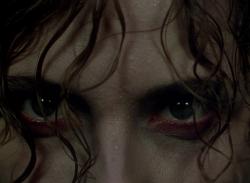
Black Narcissus
1947 -

Possession
1981 -

Carrie
1976 -

The Devils
1971 -

The Sea Serpent
1984 -

The Dark Half
1993 -

The Baby
1972 -
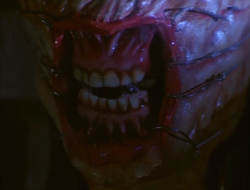
Hellraiser
1987 -

The White Reindeer
1952 -
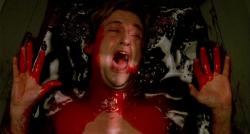
The Serpent and the Rainbow
1988 -
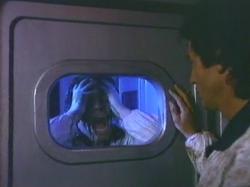
Endless Descent
1989 -

Prom Night
1980 -

Night Train Murders
1975 -
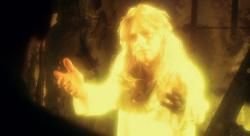
God Told Me To
1976 -

In a Child’s Name
1991 -

Beasts
1976 -

Prom Night II
1987 -

Men Behind the Sun
1986 -
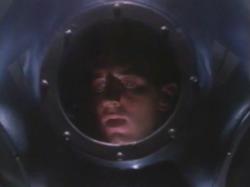
DeepStar Six
1989 -

At Midnight I’ll Take Your Soul
1964 -

They Came Back
2004 -
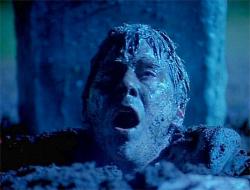
Buried Alive
1990 -
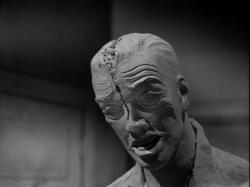
A Bucket of Blood
1959 -

Buffy the Vampire Slayer
1992 -

Night and Fog
1956 -

It Came From Beneath the Sea
1955 -
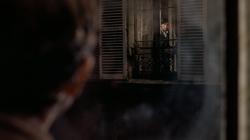
The Tenant
1976 -

Tokyo Gore Police
2008 -

The Rocky Horror Picture Show
1975
We don’t do comments anymore, but you may contact us here or find us on Twitter or Facebook.



